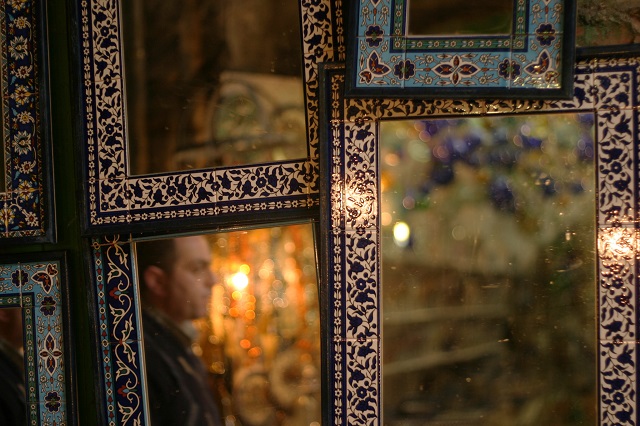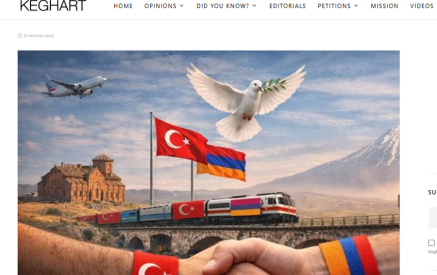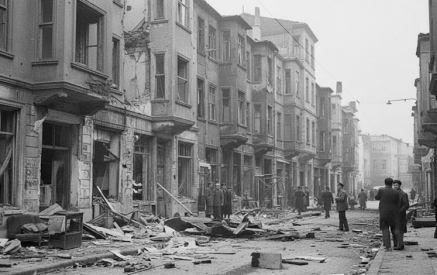A new front in the ongoing Azeri/Turkish assault on Armenians has taken the form of a deceitful defamation campaign. Their plan is crystal clear. The question we should focus on is: “Are we ready to take on this challenge?” Given the choice of a binary response, my answer would be no. This is not meant to insult the hundreds, if not thousands, of dedicated patriots across the homeland and the diaspora who are dedicating their lives to this work. It does not mean we are totally ineffective or that the future is lost. It simply means our current approach is insufficient in dealing with the nature of this challenge. Our weaknesses have been exposed. This is nothing to be ashamed of because the game has changed. The tragedy would be not to adjust. The attack is not about Turkish denial of the Genocide or even the propaganda campaign emanating from the 44-day war. This has to do with destroying the credibility of our civilization. The campaign itself has been reviewed in the last few columns. Our focus this week is our readiness to respond and succeed. Essentially our infrastructure today is designed to pursue our legislative agenda but is capable of only a defensive campaign with the Azeris.
Let us start with the assumption that discussions of this nature are difficult. We do many things well as a nation, but critical self-assessment, especially after a calamity, is not one of them. Any attempt to look in the mirror is met with criticism by that organization or institution, and open minds recede. Our history tells us that major change comes about when new organizations appear or new governments emerge. This is unfortunate. Our community was established and is sustained by these organizations. They continue to serve the internal needs of Armenians admirably. Even when some groups diminish in value, others emerge to fill the void and serve the global needs of the Armenians. Our challenge is that, in this war, the target audience is not Armenians. Yes, raising awareness within our communities is important, but the primary challenge of the defamation campaign is outside our ethnic walls. This exposes a weakness evident for many years: our ability to effectively market our identity in the geopolitical context.
We are very good at promoting our culture and have done remarkable work with specific issues like the Genocide, but these are not currently the targets of the Turkish alliance. Our view is that we have a structural/disciplinary issue in our approach to this problem. Nearly all of our infrastructure globally is built with “vertical” organizations, that is to say groups that are intact (membership, etc.) and have a hierarchy. Many are legacy groups and have built a strong foundation of loyalty and focus. This is a good thing for most of our needs. These groups such as the church, ARF, ARS, AGBU, KoV and many advocacy groups, operate within their mission. These are well-defined attributes in the cultural, educational, advocacy, political and religious domains. Collaborative efforts are increasing but are historically not a strength since loyalty tends to breed inward thinking, and these groups have been successful operating within their defined missions. Cross-disciplinary or cross-organizational work has not been a priority or even necessary. This challenge requires almost unprecedented collaboration. Today, we are seeing more cooperative ventures and collaboration as our communities increase in complexity and the work becomes more challenging. Nevertheless, this is still considered largely an internal community dynamic. Our global communities are decentralized, which serves innovation well, but presents additional challenges to coordinated or integrated efforts. In many cases, these efforts are driven by ad hoc groups to bring us together for specific events, but disband or become dormant when the “event” passes. Confronted with Azeri/Turkish defamation, we may be ready to make this a more natural process, free of the competitive tensions or dysfunctional reality that plague some of these efforts.
Read also
The current defamation effort has several new elements and therefore requires adjustments on our part to respond effectively. As always, we have options on what direction we should embrace. We can choose to do nothing and maintain the status quo. We would advise against that approach, primarily because it clearly sub-optimizes our resources with voids, redundancy and timing delays. The current state is representative of the status quo; many well-intentioned individuals and organizations are all nobly contributing, but the sum of the parts equals failure. We must accept that we are losing the marketing campaign before we will be sufficiently motivated to change. In order to progress, we must be open to the fact that our efforts today are inadequate. Thankfully it is not a matter of history, the truth or even our skills. It is more related to marketing and collaboration.
It makes sense that our weaknesses are being exploited. The Armenian nation is a complex collection of diverse groups. The Azeri/Turkish campaign is a centralized state-run effort. On the other end of the option spectrum is the creation of a new united defamation organization. We are not advocating for another organization that would create tension with significant inertia to overcome before being effective. It would just be viewed by those outside of it as another splinter in the pile. The third option is the one we feel has the highest probability of succeeding and will provide a functioning solution to the limitations we experience today. Earlier, we mentioned the assumptions to embrace in order to move forward. One is the notion that our effort today is inadequate. The other is that none of us individually or organizationally can overcome this challenge, but collectively we will be victorious.
The question is what form should “collective” take? The first step is to accept that it is quite feasible for individual organizations to be credible, and yet the challenge remains unfulfilled. This reasoning is based on the reality that no single group has the entire solution and our “vertical” structure serves as a constraint on natural collaboration. We should not be about criticizing existing groups; rather it is about increasing their effectiveness.
Imagine the possibilities if we created a “cooperative,” a “collaboration” or a “steering/clearinghouse,” where scholars and activists can interact on a periodic basis to create a sustainable process of allocating resources, sharing research and identifying the paths of influence. It would be like an umbrella where scholars can find new networks for their research and where activists will never be lacking for the information required. There is an incredible amount of quality research and literature coming from the diaspora, Armenia and Artsakh. My colleague at NAASR, Judith Saryan, has recently shared outstanding material from Transparency International, Institute for the Study of Human Rights (Columbia University), Zoravik and the Ombudsman offices in Armenian and Artsakh. These are just a few examples of the wealth that exists. We have outstanding scholars worldwide who are producing quality research. Our problem is the internal distribution of that material and getting it into the right hands. There are many active participants who are not aware of this work or how to maintain a sustainable distribution process. A cooperative effort could define a clearinghouse process that will make the right material available, commission work to fill voids and create an environment of support for the mission that we all can embrace. In the absence of sustainable collaboration, we experience redundancy and miss opportunities that aren’t covered. Cooperatives will inevitably open new avenues for the marketing of our efforts in the spheres of influence we target. The challenge of effective marketing is what frustrates the general population most frequently.
We hear constantly, “How can the truth not prevail against such a criminal adversary?” Winning this war is not about morality or the truth. We need to get past this disappointment. Yes, the Azeris/Turks spend millions, but marketing the truth should be less expensive than selling lies. They also spend a lot of money to get many people to accept their lies. A case in point is when many perfectly credible politicians and influencers accept the Azeri claim that the land of Artsakh is Azeri and always has been. The Azeris have spent tons of money establishing their post-1918 behavior as legal and smoothing over the 70-year period as “integral” to Azerbaijan. They have even published several papers that argue a false narrative of the Armenian presence in the eastern provinces going back to the time of the Persian/Russian transition with the Treaties of Gulistan (1813) and Turkmenchay (1828). They have built a continuum from the 19th century to the 21st concluding with the “liberation” of Karabakh from the Armenians in 2020. Many world politicians simply did not find our argument credible enough to change the status quo. Yes, some were bought with petro dollars, but we also know that they “out-marketed” us. Let’s accept that shortcoming, get past it and do something about it. Admitting our mistakes is not an admission of failure nor does it reduce credibility. The real problem emerges when we fail to self-assess and make adjustments.
This proposal is by no means complete. Designing a solution for a diverse nation beset with multiple challenges is an iterative process. All meaningful work starts with a vision and a concept to embrace. This is intended to be a starting point to bring the necessary and dedicated patriots together to build a sustainable collaborative model. The Azeris are focused on the foundation of our home. This may be our greatest challenge in decades. We need to look in the mirror collectively and define adjustments that will yield new results. Our capabilities are enough to succeed if we choose to manage our egos, look to each other and create more effective channels for the truth to prevail.
Stepan Piligian
Photo Caption: Mirrors with Armenian tilework in Jerusalem, March 2007 (Photo: Brian Jeffery Beggerly/Flickr)























































